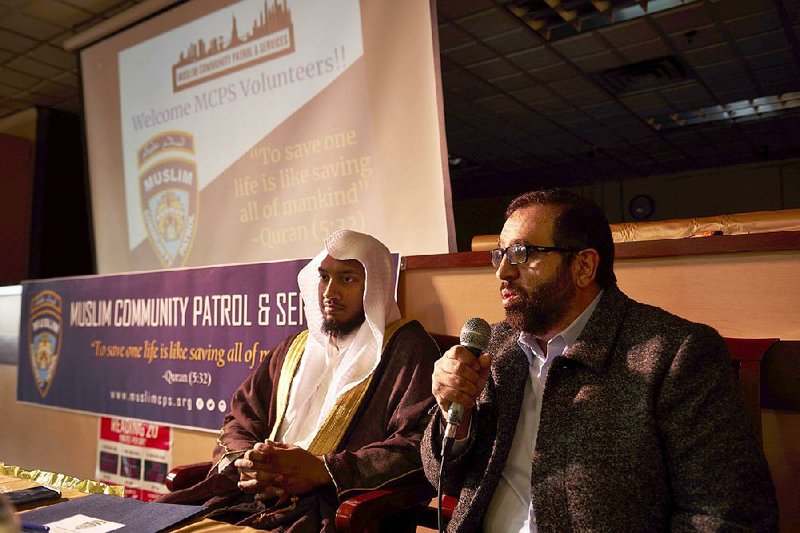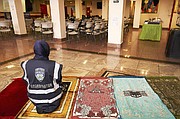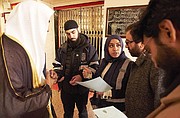NEW YORK -- Maeen Ali remembers the worry he felt when he first spotted the "Punish a Muslim Day" screed online.
The letter, mailed last spring throughout England, encouraged violence that ranged from pulling off a woman's head scarf to bombing mosques. Each attack, the letter instructed, would be rewarded with points. The hate campaign prompted the police in New York and other big cities to expand patrols around mosques and Islamic centers on the specified day.
Ali, who lives in Downtown Brooklyn, said he was consumed by thoughts of his four children's safety.
"That just boiled inside of me," said Ali, 38, who moved to the United States from Yemen in 1990. "That's when I said to myself that it was really important to come out and protect Muslims in the community."
He added, "I have to stand up."
As it turns out, he will spend most of his time sitting -- in a white Ford Taurus that is detailed to look like a police squad car with red and white emergency lights.
Ali is among the first 30 members of the all-volunteer Muslim Community Patrol & Services that is preparing to operate in neighborhoods in Brooklyn, with a goal of increasing its fleet of two cars to five by the end of the month and eventually expanding citywide. The group recently held a training led by off-duty officers from the Police Department's 72nd Precinct.
"It's like a neighborhood watch but on steroids," said Noor Rabah, the group's 31-year-old vice president who lives in Sunset Park.
As word of the new patrol has begun to spread, the backlash has been swift, even among some members of the Muslim community who have criticized the lack of information, and even questioned the need for the patrol.
Like the Shomrim that patrols largely Hasidic neighborhoods in Brooklyn and the Brooklyn Asian Safety Patrol that operates mainly in Sunset Park, the new group -- believed to be the first of its kind in the country -- hopes to function as extra sets of eyes and ears for the police.
The unarmed civilian patrol will offer translation services -- its members are fluent in any of seven languages -- explain cultural nuances, report suspicious activity, respond to traffic wrecks and even help in searches for the missing. The patrol has the support of Brooklyn's borough president, Eric Adams, and Assistant Chief Brian Conroy, the commanding officer of Patrol Borough Brooklyn South.
"More than buildings went down in 9/11. Trust between communities went down," Adams said. "We are building it back one brick at a time, and this patrol is one of those bricks."
Leaders said the group is self-funded and used donations to buy the cars and navy blue uniforms for its members, many of whom are involved with the Muslim Community Center in Sunset Park.
Volunteers plan to work in shifts, watching over arrival and dismissal times at three Islamic schools in Brooklyn and conducting patrols from 5 to 11 p.m., mostly near mosques and bus and subway stops in Bay Ridge and Sunset Park, where there are large Muslim populations. It will also link residents to food pantries, mentorship programs and counseling services. It aims to serve anyone who needs help, Rabah said, not just Muslims.
"Presence is prevention," Rabah said. "Just us being around should deter the average criminal mind of doing something to harm another person."
But in a world where far-right conspiracy theories have inspired terror plots against an Islamic enclave in upstate New York, and a travel ban has blocked residents of predominantly Muslim countries from entering the United States, nothing, it seems, is that simple.
Organizers said they were prepared for skeptics.
But they did not expect the vitriol unleashed when a photo of their new, double-parked patrol cars on Fifth Avenue in Bay Ridge turned up Dec. 21 on Facebook, and later on Instagram. The hostility spread after a far-right Canadian website, Rebel Media, posted a snippet on YouTube. The ugly online comments included accusations that the group was a stalking horse for Shariah law, and worse.
"I expected some sort of, 'Wait, what is that?' but not, 'Wait, what the hell is that?' Rabah said. "There's a big difference."
Some in the Muslim community were equally startled, but for a different reason: The cars' resemblance to New York police cruisers stoked anxieties rather than allayed them.
Somia Elrowmeim, the adult education and women's empowerment manager at the Arab American Association of New York, based in Bay Ridge, said a single misstep from the patrol could reflect poorly on the city's entire Muslim community. She said more outreach to community leaders was essential before patrols began operating.
Until then, Elrowmeim, 34, offered this message: "We don't want you near our community."
Community patrols work in concert with the police, but are not sanctioned or regulated by the Police Department. "Safety is a shared responsibility with the community, so this is an opportunity for the community to help out and work together with the police," Conroy said.
Rabah, a funeral organizer for the Janazah Project, said the Muslim Community Patrol had been a long-held dream of his and others. A series of sensational 2016 attacks, including the murder of an imam and his assistant in Queens and an attack on a Muslim woman dressed in traditional garb in Manhattan, gave energy to their cause, he said.
New York is home to an estimated 769,000 Muslims. They make up about 9 percent of the city's population, but represent 22 percent of all Muslims living in the United States, according to Muslims for American Progress.
In 2017 in the city, there were 14 reported anti-Muslim bias incidents, according to the Police Department's annual report. Last year, there were 14 bias-crime incidents recorded against Muslims during the first three quarters of the year, the most recent data available.
Huda Quhshi, the owner of LeJemalik Salon & Boutique in Bay Ridge, said she felt a "spark of happiness" when she saw a video of the patrol car on Instagram. The extra protection is welcome, she said, especially for women who wear hijabs -- "walking billboards of a Muslim" -- and are particularly vulnerable to harassment.
Quhshi, a 39-year-old native of Brooklyn who now lives in Queens, said she has not had problems while wearing a hijab, but her teenage daughter has.
"With everything going on, you sort of feel like the whole world is against Muslims," she said. "So it feels good to know that there is someone there, watching out."
Religion on 02/09/2019


